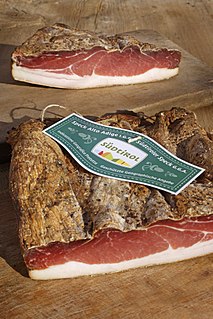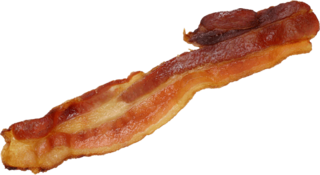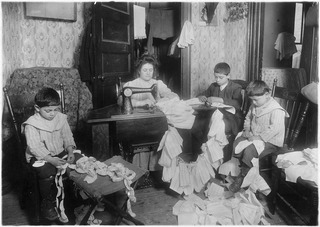
An incunable, or sometimes incunabulum, is a book, pamphlet, or broadside printed in Europe before the year 1501. As of 2014, there are about 30,000 distinct known incunable editions extant. The number of surviving copies in Germany alone is estimated at around 125,000.

Old Prussian is an extinct Baltic language once spoken by the Old Prussians, the Baltic peoples of the Prussian region. The language is called Old Prussian to avoid confusion with the German dialects of Low Prussian and High Prussian and with the adjective Prussian as it relates to the later German state. Old Prussian began to be written down in the Latin alphabet in about the 13th century, and a small amount of literature in the language survives.

Westphalia is a region in northwestern Germany and one of the three historic parts of the state of North Rhine-Westphalia. It has an area of 20,208 km2 (7,802 sq mi) and 7.9 million inhabitants.

The Low Countries, the Low Lands, or historically also the Netherlands, is a coastal lowland region in northwestern Europe, forming the lower basin of the Rhine, Meuse, and Scheldt rivers, divided in the Middle Ages into numerous semi-independent principalities that consolidated in the countries of Belgium, Luxembourg, and the Netherlands, as well as today's French Flanders.

Walther von der Vogelweide was a Minnesänger, who composed and performed love-songs and political songs ("Sprüche") in Middle High German. Walther has been described as greatest German lyrical poet before Goethe; his hundred or so love-songs are widely regarded as the pinnacle of Minnesang, the medieval German love lyric, and his innovations breathed new life into the tradition of courtly love. He is also the first political poet writing in German, with a considerable body of encomium, satire, invective, and moralising.
Proofreading is the reading of a galley proof or an electronic copy of a publication to detect and correct production errors of text or art.

Mechthildof Magdeburg, a Beguine, was a Christian medieval mystic, whose book Das fließende Licht der Gottheit described her visions of God. She was the first mystic to write in German, as she did not know how to write in Latin.
Middle High German is the term for the form of German spoken in the High Middle Ages. It is conventionally dated between 1050 and 1350, developing from Old High German and into Early New High German. High German is defined as those varieties of German which were affected by the Second Sound Shift; the Middle Low German and Middle Dutch languages spoken to the North and North West, which did not participate in this sound change, are not part of MHG.

The 33rd Infantry Division was a German Army infantry division active in World War II. It served in the battle of France and subsequently was converted into the 15th Panzer Division.

The Sabattier effect, also known as pseudo-solarization, is a phenomenon in photography in which the image recorded on a negative or on a photographic print is wholly or partially reversed in tone. Dark areas appear light or light areas appear dark. Solarization and pseudo-solarization are quite distinct effects. Over time, the "pseudo" has been dropped in many photographic darkroom circles and discussions, but the effect that is meant is the Sabattier effect and not the solarization by extreme overexposure.

Eastphalia is a historical region in northern Germany, encompassing the eastern Gaue (shires) of the historic stem duchy of Saxony, roughly confined by the River Leine in the west and the Elbe and Saale in the east. The territory corresponds with the southeastern part of the present-day states of Lower Saxony, western Saxony-Anhalt and northern Thuringia. Together with Westphalia, central Angria and Nordalbingia it was one of the four main Saxon administrative regions. It should not be confused with East Westphalia (Ostwestfalen).

Rhinelandic is a term occasionally used for linguistic varieties of a region on both sides of the Middle and Lower Rhine river in Central West Germany, Belgium, the Netherlands, and Luxembourg. It has at least two distinct meanings which often can only be determined from the fine grain context in which the term is used. One of the meanings of Rhinelandic is that of a group of local languages in an area called the Rhineland. Another meaning is that of the regiolect being used by the people approximately of the same area.
The Deutsche Singmesse is a form of (Tridentine) Low Mass that developed in German-speaking countries.
Electroextraction (EE) is a sample enrichment technique that focuses charged analytes from a large volume of one phase into a small volume of aqueous phase through the application of an electric current. The technique was originally developed as a separation technique for chemical engineering, but has since been coupled to capillary electrophoresis and liquid chromatography–mass spectrometry as a means of improving limits of detection, analysis time, and selectivity. The use of EE-CE has made capillary electrophoresis more applicable to use in the pharmaceutical industry.
In historical Germanic society, nīþ ; was a term for a social stigma implying the loss of honour and the status of a villain. A person affected with the stigma is a nīðing, one lower than those around him. Middle English retained a cognate nithe, meaning "envy", "hate", or "malice."
Thomas Kantzow was a chronicler in the Duchy of Pomerania. He studied at the universities of Rostock and Wittenberg, and was a secretary of the Pomeranian dukes. His manuscripts, rediscovered in 1729, 1832 and 1973, are written in Low German and Standard German language, and were printed in the 19th and 20th centuries. They contain a Low German and three Standard German chronicles covering the history of Pomerania until 1536.

An arms race, in its original usage, is a competition between two or more states to have the best armed forces. Each party competes to produce more weapons, larger military, superior military technology, etc. in a technological escalation.
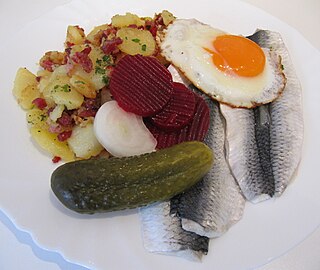
Due to its centuries-old history as a major port town the cuisine of Hamburg is very diversified and sapid as ingredients’ supply was safe. Until the 20th century the cuisine of Hamburg was predominantly characterized by the extensive choice of different kinds of fish from the river Elbe and the nearby Baltic Sea. The region of Vierlanden supplied Hamburg with fresh vegetables. Fruit came from the area Altes Land and until industrialization the neighbourhood of Wilhelmsburg was considered the ‘milk isle’ of Hamburg. International trade in the Port of Hamburg made spices and exotic nutrition items from India and South America available since the 16th century which were soon incorporated into civic kitchens. On this basis the cuisine of Hamburg developed which regrettably lost some of its characteristics nowadays due to the supraregional harmonization of the North German cuisine. But due to its high economic importance Hamburg does feature many internationally recognized gourmet restaurants from which 11 were repeatedly awarded with a Michelin star in 2010.
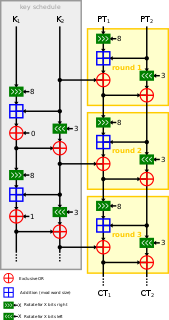
Speck is a family of lightweight block ciphers publicly released by the National Security Agency (NSA) in June 2013. Speck has been optimized for performance in software implementations, while its sister algorithm, Simon, has been optimized for hardware implementations. Speck is an add–rotate–xor (ARX) cipher.


